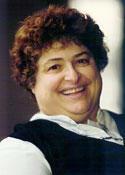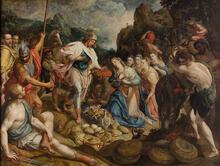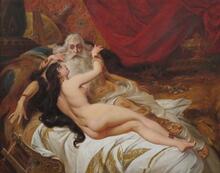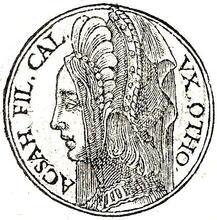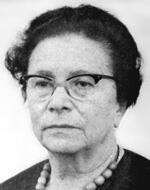Woman Wisdom: Bible
In some of the books of the Hebrew Bible, “wisdom” is personified as a female character. This character is shown no only in traditional roles of women as a mother and housekeeper, but also as a prophet and a source of counsel. Her portrayal often draws comparisons to goddesses outside of the Hebrew Bible, such as the Egyptian goddesses Ma’at and Isis, the Sumerian Inanna, and the Babylonian Ishtar. There is debate over whether Wisdom was worshipped as a goddess, and ultimately her presentation is ambiguous. Nevertheless, the stories of Woman Wisdom are significant for their use of a woman’s voice in male books.
The books of Proverbs and Job, along with Ecclesiastes and the Apocryphal/Deuterocanonical Books of Sirach and the Wisdom of Solomon, are classified by scholars as “wisdom literature” because of their interest in this fundamental human attribute and its relationship to the divine, and because of their similarities to other ancient Near Eastern literature with similar forms and concerns. Notable in Proverbs and the Wisdom of Solomon (and to a lesser degree in Job and Sirach) is the personification of the concept of wisdom as a woman (here referred to as Woman Wisdom to distinguish the personified figure from the more general use of the term).
Female Personification of Wisdom
Why the female personification? Perhaps in part because, in Hebrew, wisdom is a grammatically feminine noun. Grammar does not fully explain, however, Proverbs’s interest in repeated and varied development of the female persona, which contrasts with the only incipient personification in Job. The female imagery for Woman Wisdom is also closely connected to her negative counterpart in Proverbs, that embodiment of evil referred to as the “loose woman” (“strange woman,” or “Woman Stranger”).
Job 28, perhaps originally an independent poem, now serves as an interlude within Job’s final discourse of self-defense. The poem begins with the image of mining—humans’ difficult but successful search for precious things in earth’s depths—to highlight by contrast the negative answer to its central question: “But where shall wisdom be found?/And where is the place of understanding?” (28:12; compare v. 20). Although the mythological entities Abaddon and Death have “heard a rumor of it,” only God understands the way to it” (vv. 22–23). Here, the NRSV appropriately translates the pronoun referring to wisdom as a neuter, because, although the concept is accorded a high degree of independent existence, it has yet to be personified. As in Proverbs, wisdom is associated with God’s creative and ordering activities. Surprisingly, wisdom seems to be something even God has to “search out” (28:27; is there a hint of personification here?), though God’s successful search concludes with a conventional instruction: “Truly, the fear of the Lord, that is wisdom” (28:28).
The female personification of wisdom in Proverbs is dramatic, exalted, and varied, leading scholars to draw correlations both to ancient Near Eastern goddesses and to the roles and literary portrayals of women of the time. It is particularly notable in a book that feminist scholars generally acknowledge as perhaps the most androcentric in the Bible, its instructions addressed clearly to a “son” or “sons” (the NRSV’s efforts at the inclusive “child/ren” notwithstanding) from, presumably, a father-teacher (4:1–4). Brenner, however, argues for the possibility of a mother-teacher’s voice and interests as well, patriarchally conditioned though these may be.
Reflections of traditional women’s roles—especially aspects of the role of wife—may be seen in the characterizations of Woman Wisdom in Proverbs 3:13–18, 4:5–9, 7:4–5 and 9:1–6. Lest the modern reader think “only a wife,” one must note the real, if behind-the-scenes, social power wielded by the wife as manager of an extended and productive family household and as counselor to husband and children (see Proverbs 31:10–31). Just as the husband of this capable wife “will have no lack of gain” (31:11), so also Woman Wisdom will exalt and honor the man who prizes and embraces her (3:13–18; 4:8). Both bring the trusting husband a “crown” (4:9; 12:4). Just as the wife provisions “her household” (31:21) with both moral and material well-being, so also Woman Wisdom builds her house, sets her table, and teaches “the way of insight” (9:1–2, 6; 14:1). Both wife and Wisdom are, moreover, desirable sexual partners: Proverbs 5:15–19 urges husbandly faithfulness and satisfaction in his wife’s body, while 7:4 tells the seeker of Wisdom to call her “sister,” a term of endearment common in the Song of Solomon.
Public imagery and domestic imagery both appear in passages on Woman Wisdom. A variation on the human imagery occurs in Proverbs 1:20–33 and 8:1–21, where she appears as a prophet, calling out for followers in the most public places of human interaction: in the street and squares, at the busiest corner and the city gates (1:21–22), on the heights, beside the way, and at the crossroads (8:2). Her rhetoric of persuasion offers both carrot and stick. To one who chooses her way, she offers wealth and power, as well as “fruit … better than gold” (8:15–19). To those who ignore her counsel, she promises mockery when panic strikes and ultimately death (1:26, 32). Woman Wisdom’s vocabulary, especially in Chapter 1, is reminiscent of prophetic language (she “calls,” is “refused,” “stretches out her hand,” needs to be “sought” and “found”; 1:24, 28, 8:17; compare 2 Chronicles 15:2, Isaiah 6:9–10, 65:1–2; Hosea 5:6, Amos 8:12. The prophets, however, use such terminology to describe Israel’s relationship to God; Wisdom speaks of relationship with herself!
Deification of Woman Wisdom:
This at first subtle shift from the prophet’s role as speaker for God to more intimate identity with God takes a dramatic turn in Woman Wisdom’s self-description in 8:22–36. Translation of the verb in 8:22a is debated. The NRSV’s “The Lord created me” (from the Septuagint) is less likely correct than either “acquired” or “conceived” (in the biological sense; compare “I was brought forth” in vv. 24–25). A similar ambiguity occurs in 8:30a, where the NRSV’s “master workman” could also be “darling child.” In either case, Woman Wisdom is present with God before and during the process of creation, as a playful child (see 8:30b) or a wise architect, or, in the artful ambiguity of poetry, both! It is this primordial relationship that authorizes her claim in 8:35: “whoever finds me finds life/and obtains favor from the Lord.”
This near-deification of Woman Wisdom in 8:22–36 cannot help but recall certain ancient goddesses, in this case especially Ma’at, the Egyptian goddess of justice, who was also understood both as the child of the creator god and (especially in Egyptian wisdom literature) as the ordering principle of creation. Allusions to Ma’at may also be seen in Wisdom’s claim to establish just rule (8:15–16) and in the depiction of her with long life in her right hand and wealth in her left (3:16), for Ma’at also appears with the ankh, symbol of life, in one hand and a scepter in the other.
Parallels may also be drawn to the Egyptian Isis, the Sumerian Inanna, and the (related) Babylonian Ishtar/Canaanite Astarte. Some of these parallels depend on a related analysis of Proverbs’s strange woman (loose woman) as representative of the love and fertility practices of the Ishtar/Astarte cults. Lang has suggested that Wisdom was worshipped as a goddess of scribes, though this remains speculative. New archaeological evidence for the ongoing Israelite worship, well into the monarchic period, of the Canaanite goddess Asherah alongside YHWH has led McKinlay to argue that female-personified Wisdom is part of a complex dynamic of theological convergence, wherein YHWH took on attributes of Asherah as worship of the goddess was repressed. Asherah, associated symbolically with trees, was reduced, in effect, to the wisdom of YHWH personified, who is “a tree of life to those who lay hold of her” (Proverbs 3:18).
Significance of Woman Wisdom
Attempts to understand the significance of Woman Wisdom in ancient Israelite life and in the canonical and deuterocanonical traditions underscore her deep ambiguity: to feminist thought, whether historically or theologically inclined. At worst she represents the domestication of a powerful goddess into a good wife who supports her man and whose honor depends on his willingness to give her public recognition. Along with her counterpart, Woman Stranger, she may be seen as part of patriarchy’s perennial classification of all women as either all-good or all-evil, and her apparent power but a mouthpiece for the voice of the fathers.
On the other hand, it is difficult to read Proverbs’s paeans to the power of both wisdom personified as woman (Chapters 1–9) and of woman as the ideal representative of wisdom (Chapter 31) without imagining some related social reality at their base. One likely context for such open recognition of women’s contributions—as well as perceived danger from “loose women”—is the period after the Babylonian exile, as the Judeans struggled for a new definition of “Israel” as a people identified by family households rather than a monarchic polity. Especially notable is the editor’s choice to open and close the Book of Proverbs with female imagery. Whatever one might make of it—whether ultimate co-optation or ultimate subversion—this quintessentially male book is framed with a woman’s voice.
Brenner, Athalya. “Some Observations on the Figurations of Woman in Wisdom Literature.” In Of Prophets’ Visions and the Wisdom of Sages: Essays in Honour of R. Norman Whybray on His Seventieth Birthday, edited by Heather McKay and David J. A. Clines, 192–208. Sheffield, England: 1993.
Camp, Claudia V. Wisdom and the Feminine in the Book of Proverbs. Decatur, Georgia: 1985.
Fontaine, Carole. “Proverbs.” In Harper’s Bible Commentary, edited by James L. Mays, 495–517. San Francisco: 1988.
McKinlay, Judith E. Gendering Wisdom the Host: Biblical Invitations to Eat and Drink. Sheffield, England: 1996.
Meyers, Carol, General Editor. Women in Scripture. New York: 2000.
Newsom, Carol A. “Woman and the Discourse of Patriarchal Wisdom; A Study of Proverbs 1–9.” In Gender and Difference in Ancient Israel, edited by Peggy L. Day, 43–57. Minneapolis: 1989.
Sinnot, Alice M. The Personification of Wisdom. Routledge, 2005.

